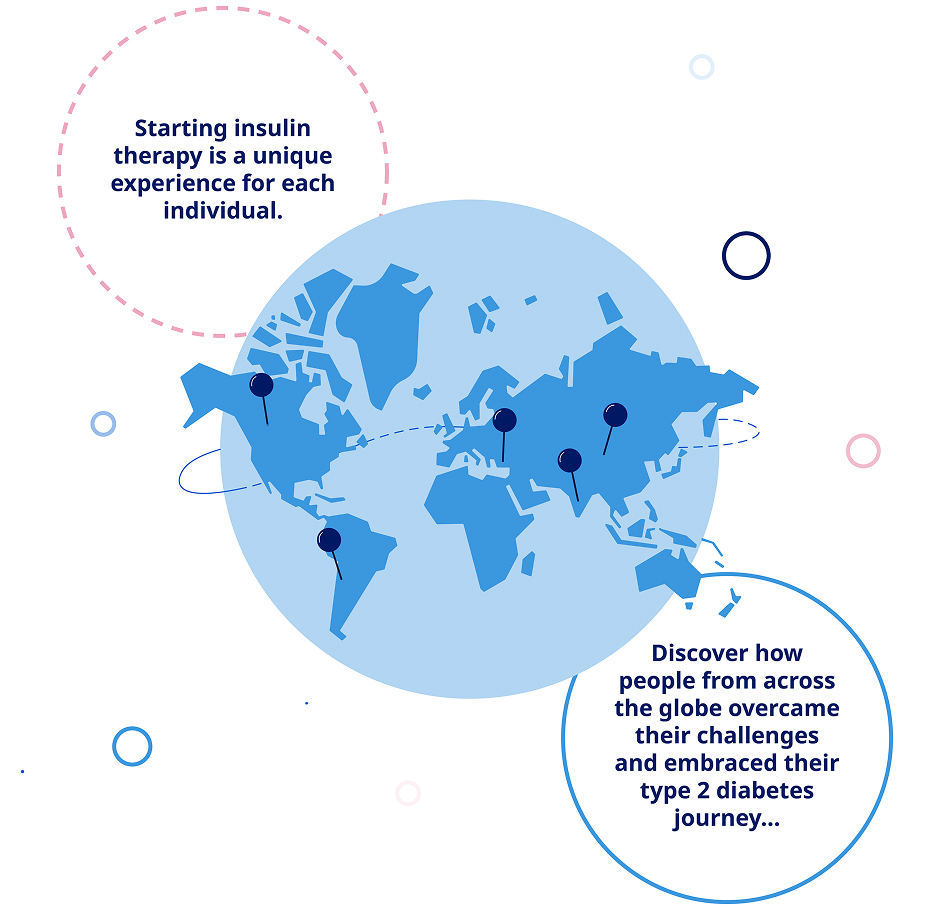
“Saying the words should and must – even internally – will help to create that stress. When you are calm and relaxed, you are in control of your own body.”
Everyone can get stressed. Everyone can experience anxiety. And everyone can have moments of worry and panic. If you are living with type 2 diabetes, however, such episodes may challenge you in ways that are slightly different from how they challenge others. As with everything else, though, it is possible to find mechanisms and strategies that work for you.
Ken Tait is living with type 2 diabetes and in the following article he shares 5 personal tips that may help to take you safety through life's stressful and anxious moments - and to help you feel more peaceful, confident and happy as you live your life with diabetes.
If you are newly diagnosed, it is perfectly normal to feel stressed by new challenges. You may be nervous about what diabetes will mean for your quality of life, your safety, your dreams, commitments and people around you.
In an effort to guide and support you, lots of people – including healthcare professionals, friends and family members – may offer tips about diet, lifestyle, exercise and more. Advice can be helpful, but it can also have the unintended effect of creating stress.
Your best defense against this kind of stress is to understand what is going on. If you have ever tried to give advice to someone, you know that it can be very hard to not use words like “should”, “don’t” and “must”. And as a person with diabetes, you have probably heard some of these:
• You should exercise regularly.
• Don’t have more than one piece of cake.
• People with diabetes must say goodbye to sugar.
If taken the wrong way, these words can wear you down rather than build you up. It would be good to learn how to filter what is useful from what feels pushy and mainly feeds your stress.
“Saying the words should and must – even internally – will help to create that stress. When you are calm and relaxed, you are in control of your own body.”
Here’s an example: You may have been told that you must give up cookies. If taken literally, this leaves no wiggle room in which to be YOU – the you that quite likes cookies. What you can take away from such advice is that there are good reasons why cookies should be enjoyed sensibly and perhaps only on special occasions.
As you get better at learning from advice, you will also be easier on yourself when – occasionally and with good judgement – you choose to disregard it.
Advice is intended to guide and support you, not punish you. Receive it as a tool, not a weapon. And go easy on yourself when diabetes challenges you in ways you aren’t prepared for.
A medical condition can be overwhelming until you find the right coping mechanisms. Doubts and questions may fill your head. “What’s going on?” “What is my body doing?” “How will I feel if I eat this?” Such questions can create the experience of stress, which may manifest in a number of symptoms1:
• Headaches
• Disrupted sleep – or too much sleep
• Tense and painful muscles
• Exhaustion
• Feeling ill or feeble
If you have one or some of these symptoms, you are likely to also feel irritable, unmotivated, depressed or nervous.

“When you are calm and relaxed, you are in control of your own body.”
A great way to neutralise what may feel like a downward spiral is through mindfulness or breathing exercises (or both!). Many studies show that by breathing properly, you can reduce stress, prevent insomnia, control emotions and help improve attention2. Yoga, meditation or exercise may have similar effects.
Breathing can be used to regulate emotions and enhance well-being in a number of ways. Some techniques emphasise mindful perspectives on experience, while others consider the physical side.
How do you pick a system? Remember that no two people are the same, and no two conditions are the same. This means you will have to do some browsing and try out different breathing or meditation techniques in order to find the one you prefer.
And as with everything, practice is the key. So stick with what works, and you are likely to feel increasingly more relaxed and in charge of your body and your mind.
There is another important reason why stress management benefits people living with diabetes, and it has to do with the glucose levels in your blood. When the body experiences stress, it is preparing to manifest a dramatic response to the environment – commonly known as the fight-or-flight response3.
When the fight-or-flight response is activated, a number of reactions happen in the body3,4:
• Respiration rates are increased.
• Blood is directed to the muscles and limbs.
• Hormone levels are elevated.
As a result of acute stress, adrenaline, cortisol and glucose are released into your bloodstream. If you are living with diabetes, your body may not be able to turn the released glucose into the energy your fight-or-flight state is calling for. This will cause it to build up in the bloodstream – as you will see for yourself if you check your sugar level with a blood glucose meter3,4.
In stressful situations, practice breathing through it. Controlling your reaction to stress can help you manage your blood sugar levels, which is a great skill to have in the long run.
“Snacks are things you don’t really need but feel you need.”
Food stimulates us and generally makes us feel good. That is why food is used for more than merely satisfying hunger. Many people are familiar with using food as a means of achieving comfort or dealing with difficult emotions.
For those living with diabetes, uncertainty about diet can cause anxiety and stress. Ironically, food can offer temporary relief from dietary stress. But the key word here is “temporary”.
Many people can relate to the pleasure of chocolate, and with good reason. Studies have shown that some types of chocolate may lower levels of stress hormone cortisol and decrease symptoms of anxiety5. But when you engage in stress eating, you are trading long-term metabolic balance and control for short-term temporary relief. Stress eating is understandable, of course, but keep an eye on your tendency to alleviate stress through eating. Don’t add an addictive relationship to food to the challenges of living with diabetes.
“Things like chocolate make you feel good – for about a nano second. And then we eat more. And then we eat more. And then we eat more.”
If you do “slip” and find yourself enjoying food that is NOT part of your meal plan, then ask yourself if you are able to stop before you get to the bottom of the bag or bowl. Learn to stop by your own choice, because NOT stopping amounts to a loss of control, which will compromise your health and increase the risk of hyperglycaemia.
When it comes to injecting medicine into your body, your natural response may be nausea or fear (of pain or injury). After all, needles pierce the skin and can make you bleed. But your fear of pain is often much greater than the actual pain associated with injections. Your mind is playing a trick on you.
Because we are talking about a mental challenge again – that is, a matter depending on perspective and mindset – the best way to overcome the challenge is psychological.
As with the situations of stress and worry mentioned earlier, try breathing your way through your troubled emotions. When you get the hang of it, you may effectively exhale any negativity. As a result, you may experience relaxed muscles, greater control over your emotions and reduced pain6.
When you are mentally stabilised, empowered and calm, you may feel much better equipped for the challenge of introducing medicine into your body through a pen or needle.
“We need to change the belief that it is going to hurt. So relax the muscles. It’s as simple as that.”
People living with diabetes are on their own with their condition the vast majority of the time. Access to the support and counsel of healthcare professionals can be quite limited, which may create feelings of frustration or helplessness. A life-changing condition like type 2 diabetes is too much to bear on your own and without guidance, not least because it can put an additional damper on your social life until you find the strategies that work for you.
Consider joining a support group close to where you live. Get active and reach out to your community.
Creating bonds and friendships has the added bonus of alleviating stress, anxiety, depression and loneliness.
“I needed that support. And I’m sure that other people did too.”
If you are newly diagnosed, there may be a temptation to focus on all that diabetes puts in your way or takes away from you. It is natural to conclude that something terrible and unfair has happened and that you are a victim of circumstance. But what if you tried to consider the things that diabetes makes possible?
“It gives me such a warm feeling within myself to know that I helped somebody so that they are living their life instead of their life living them.”
Diabetes is your body trying to tell you to care for it in a new way – which YOU ABSOLUTELY CAN DO, especially after learning a few tips and tricks about food and exercise. These lessons can help you experience a newfound respect for yourself.
You may even become someone other people with diabetes can turn to for guidance and support, companionship and friendship. When that happens, it’s easy to see that an unwelcome diagnosis can become a source of purpose, an invitation to meaning and an opportunity to be awesome.
HQ23DI00451

We spoke to real people living with type 2 diabetes to explore their experiences of starting and living with insulin therapy.
Explore the stories here.





